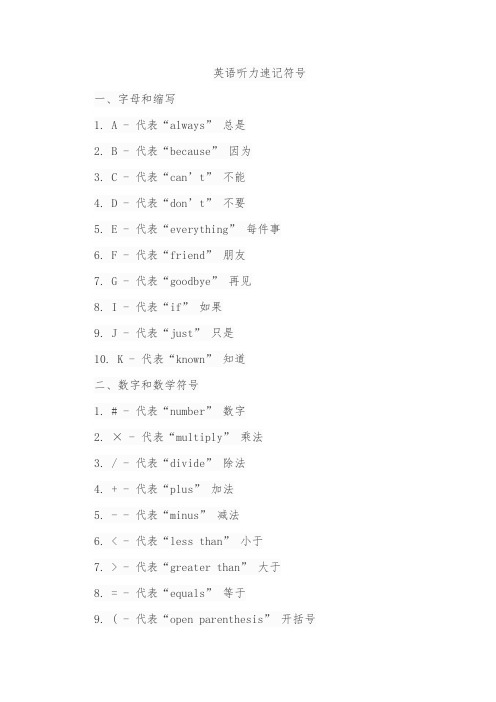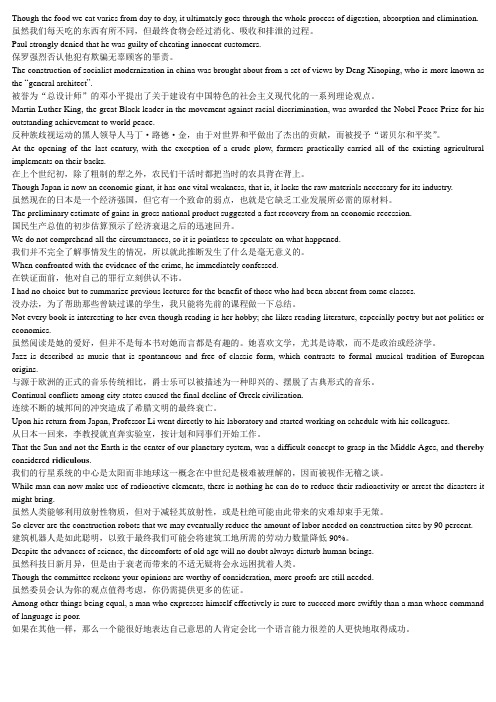快捷英语四周通--A
- 格式:doc
- 大小:22.00 KB
- 文档页数:3


朗文快捷英语IVExit 1Friends and neighborsLead-in1. Gloria had just moved into Michael’s building. She is asking him a question about one of the rules of the building. What do you think they are saying to each other?2. Vincent is having a problem with something in his house. He is calling his neighbor David and is asking him for advice. What do you think Vincent and David are saying to each other?Focal Points1. Greet someone and introduce yourself, using noun clauses2. Ask for information about a neighborhood, using embedded questions.3. Ask permission to do something4. Offer to help someone, using gerunds.5. Ask a favor of someone6. Give advice about home repairs, using should and gerunds.7. Inquire about home repair services, using embedded questions.8. Discuss home repairs, using embedded questions.Functions1. Greeting people.2. Offering to help.3. Appreciation.4. Permission.5. Requests.6. Advice-suggestions.7. Asking for and reporting information.Exit 2Calling people going placesLead-in1. Amy is talking to an airline ticket agent on the telephone. What do you think they are saying to each other?2. Emily is leaving a message for Alice, who isn’t there. What do you think Emily and the person who has answered the phone are saying to each other?Focal Points1. Learn how to make different kinds of telephone calls, using imperatives.2. Call for transportation and recreation reservations, using embedded questions and short answers.3. Make person-to-person collect calls.4. Understand transportation safety rules, using imperatives and reported speech.5. Ask about transportation, using embedded questions.6. Leave telephone messages, using noun clauses and embedded questions.Functions1. Asking for and reporting information.2. Attracting attention.3. Want-desire.4. Offering to help.5. Offering to do something.6. Initiating conversation.7. Checking and indicating understanding.8. Asking for repetition.9. Apologizing.10. Instructing.Exit 3Personal financesLead-in1. Susan and Peter are talking about how much cash they need to get at the bank for the weekend. What do you think they are saying to each other?2. Jeff is talking to a bank officer about taking out a loan. What do you think Jeff and the bank officer are saying to each other?Focal Points1. Discuss family budgeting, using should and have to2. Discuss paying bills, using time expressions.3. Discussing balancing a checkbook.4. Complain about mistakes on bills, using the passive voice.5. Learn about banking practices and procedures, using embedded questions.6. Discuss loan applications, using embedded questions.7. Evaluate the affordability of items, using the present perfect tense.8. Provide information for a credit card application.Functions1. Remembering/Forgetting2. Asking for and reporting information3. Advice-suggestions4. Obligation5. Certainty/uncertainty6. Initiating a topic7. Hesitating8.Checking and indicating understanding9. Likes and dislikes10. Agreement/ DisagreementExit 4Rules and Regulations at SchoolLead-in1. Janet is a passenger n Frank’s car. Frank just did something he should not have. What do you think Janet and Frank are saying to each other?2. Mrs. Taylor is talking to her son about a telephone call she just received from her son’s teacher. What do you think Mrs. Taylor and her son are saying to each other? Focal Points1. Ask whether things are allowed, using impersonal expressions with you.2. Tell people they aren’t allowed to do things.3. Understand traffic violations, using different verb tenses.4. Understand traffic violations, using perfect modals5. Discuss parent-teacher communication, using reported speech.6. Discuss notes to a teacher, using reported speech.7. Discuss student performance in school, using embedded questions.8. Discuss grades and evaluation, using the passive voice, the past tense, and should have.Functions1. Permission2. Requests.3. Asking for and Reporting information.4. Possibility/Impossibility5. Intention.6. Surprise-Disbelief.7. Attracting attentionExit 5At W orkLead-in1. Barry is asking his supervisor for feedback on something he has just done at work. What do you think Barry and his supervisor are saying to each other?2. Doris is depending on her employee, Marta, to do something important at work. What do you think Doris and Marta are saying to each other?Focal Points1. Offer to help someone at work, using want + object + infinitive and should have2. Ask for feedback on job performance, using the present perfect tense.3. Give feedback on job performance, using could have, supposed to, and short answers.4. Correct someone at work5. Warn someone about a dangerous situation, using had better.6. Make promises to fulfill responsibilities, using the present real conditional. Functions1. Offering to do something2. Approval/Disapproval3. Correcting4. Warning5. Advice-suggestions6. Promising7. Asking for repetition8. GratitudeExit 6Rights and responsibilitiesLead-in1. Henry is returning something to a store because there is a problem with it. What do you think Henry and the sale person are saying to each other?2. Greg is talking to Stella about a problem he is having in his apartment building. What do you think Greg and Stella are saying to each other?Focal Points1. Express dissatisfaction with products, using short answers.2. Express dissatisfaction with services, using different verb tenses.3. Make requests of neighbors, using short answers and sequence of tenses.4. Discuss housing repair problems, using reported speech and sequences of tenses.5. Complain about housing problems, using the present perfect tense.6. Discuss employee rights.7. Discuss taking legal action.8. Discuss citizen’s rightsFunctions1. Complaining2. Satisfaction/ Dissatisfaction3. Advice-Suggestion4. Focusing attention5. Preference6. Requests7. Asking for and reporting additional information\8. Want-desire9. Apologizing10. Intention.11. Certainty.12. DisappointmentExit 7Friends ,Family, and Co-workersLead-in1. Lisa and Jasmin are having a discussion about something. Are they agreeing or disagreeing with each other? What do you think they are saying?2. Alan and Karen are complaining about something at work that they wish were different. What do you think they are saying to each other?Focal Points1. Agree with someone using emphatic sentences and tag questions.2. Disagree with someone.3. Give compliments, using adjectives and question formation.4. Express opinions, using adjectives.5. Discuss television viewing, using adjectives6. Express concerns, using wish-clauses and the present unreal conditional.7. Admit something to someone, using the past unreal conditional.8. Discuss important issues, using gerunds, wish-clauses, and hope-clauses Functions1. Agreement/Disagreement.2. Likes/Dislikes3. Admitting.4. Asking for and reporting information.5.Regret6. Sympathizing7. Wish—hope8. ComplimentingExit 8Strategies for communicating saying good-byeLead-in1. Indicate conversations, using tag questions and short answers.2. Politely interrupt people3. Asking for and give clarification4. Clarify statements, using reported speech and sequence of tenses.5. Say good-bye to someone by expressing obligation.6. Express opinions about controversial issuesFocal Points1. Clarification.2. Interrupting3. Focusing Attention.4. Agreement/Disagreement5. Asking for repetition6. Leave Taking7. Obligation.8. Checking and indicating understanding9. Asking for and reporting information Functions1. Clarification2. Interrupting3. Focusing attention4. Agreement/Disagreement5. Asking for repetition6. Leave taking7. Obligation8. Checking and indicating understanding9. Asking for and reporting information。



英语听力速记符号一、字母和缩写1. A - 代表“always” 总是2. B - 代表“because” 因为3. C - 代表“can’t” 不能4. D - 代表“don’t” 不要5. E - 代表“everything” 每件事6. F - 代表“friend” 朋友7. G - 代表“goodbye” 再见8. I - 代表“if” 如果9. J - 代表“just” 只是10. K - 代表“known” 知道二、数字和数学符号1. # - 代表“number” 数字2. × - 代表“multiply” 乘法3. / - 代表“divide” 除法4. + - 代表“plus” 加法5. - - 代表“minus” 减法6. < - 代表“less than” 小于7. > - 代表“greater than” 大于8. = - 代表“equals” 等于9. ( - 代表“open parenthesis” 开括号10. ) - 代表“close parenthesis” 闭括号三、标点和符号1. , - 代表“comma” 逗号2. . - 代表“period” 句号3. ? - 代表“question mark” 问号4. ! - 代表“exclamation mark” 感叹号5. ; - 代表“semicolon” 分号6. " - 代表“quotation marks” 双引号或单引号7. ' - 同上,也是引号的意思8. : - 同上,也是引号的意思9. & - 代表“and” 和10. * - 代表“star” 星号或乘号的意思四、图像和图形1. @ - 可以代表“at the” 在某处或某个时间点前2. @@ - 可以代表重复前一个符号或单词3. ~ - 可以代表“wave” 波浪形状,也可以表示声音的延长。

Though the food we eat varies from day to day, it ultimately goes through the whole process of digestion, absorption and elimination. 虽然我们每天吃的东西有所不同,但最终食物会经过消化、吸收和排泄的过程。
Paul strongly denied that he was guilty of cheating innocent customers.保罗强烈否认他犯有欺骗无辜顾客的罪责。
The construction of socialist modernization in china was brought about from a set of views by Deng Xiaoping, who is more known as the “general architect”.被誉为“总设计师”的邓小平提出了关于建设有中国特色的社会主义现代化的一系列理论观点。
Martin Luther King, the great Black leader in the movement against racial discrimination, was awarded the Nobel Peace Prize for his outstanding achievement to world peace.反种族歧视运动的黑人领导人马丁·路德·金,由于对世界和平做出了杰出的贡献,而被授予“诺贝尔和平奖”。
At the opening of the last century, with the exception of a crude plow, farmers practically carried all of the existing agricultural implements on their backs.在上个世纪初,除了粗制的犁之外,农民们干活时都把当时的农具背在背上。
成人英语单词速记法口诀一、以字母“a”开头的单词。
1. able [ˈeɪbl] adj. 能够的;有能力的。
- 口诀:“a”加“ble”,能力就有了(able)。
2. about [əˈbaʊt] prep. 关于;大约。
- 口诀:“a”在开头,“bout”像船(bout有比赛、较量的意思,这里联想船在周围转,大概、关于某个区域),关于和大约。
3. above [əˈbʌv] prep. 在……上面;高于。
- 口诀:“a”先到,“bove”(联想b和v像两个向上的箭头)在上方,在……上面记心房。
二、以字母“e”开头的单词。
1. eat [iːt] v. 吃。
- 口诀:“e”像嘴巴张大,“at”就吃(eat)它。
2. egg [eɡ] n. 蛋。
- 口诀:“e”双写像蛋壳,“gg”像两个蛋黄,蛋(egg)就记住啦。
3. easy [ˈiːzi] adj. 容易的。
- 口诀:“e”开头,“asy”(联想a像一个滑梯,很容易滑下)很容易,容易的(easy)别忘记。
三、以字母“i”开头的单词。
1. ice [aɪs] n. 冰。
- 口诀:“i”像冰柱,“ce”结尾冰(ice)来记。
2. ill [ɪl] adj. 生病的。
- 口诀:“i”像病人躺着,两个“l”像两根病床栏杆,生病(ill)的模样。
3. in [ɪn] prep. 在……里面。
- 口诀:“i”进“n”门,在里面(in)。
四、以字母“o”开头的单词。
1. open [ˈəʊpən] v. 打开;adj. 开着的。
- 口诀:“o”像洞口,“pen”(笔也能用来打开东西,如开信封)来打开,打开(open)状态来。
2. orange [ˈɒrɪndʒ] n. 橙子;橙色。
- 口诀:“o”像橙子形状,“range”范围(橙子在水果的范围里),橙子(orange)橙色香。
3. old [əʊld] adj. 老的;旧的。
- 口诀:“o”圆滚滚像老人的背,“ld”(联想l像拐杖,d像老人的脚)老又旧(old)。
1.学英语的口诀动词为纲滚雪球,难易编组抓循环同类归纳印象深,图示介词最直观混淆多因形音义,反义词语成对念构词方法不可忘,习惯用语集中练词不离句法最好,课外阅读莫间断2.be 的用法口诀我用am,你用are,is连着他,她,它;单数名词用is,复数名词全用are.变疑问,往前提,句末问号莫丢弃变否定,更容易,be后not莫忘记疑问否定任你变,句首大写莫迟疑3.时间名词前所用介词的速记歌年月周前要用in,日子前面却不行遇到几号要用on,上午下午又是in.要说某日上下午,用on换in才能行午夜黄昏须用at,黎明用它也不错at也用在明分前,说差可要用上to,说过只可使用past,多说多练牢牢记,莫让岁月空蹉跎4.可数名词的复数变化规律[1]:名词复数有规律,一般词尾加s;辅音字母+y型,变y为i,es;ch,sh真有趣,s,x,es;f,fe真小气,字母v来把它替,es在后别忘记;字母o来真神奇,有生命来es,没有生命+s.5.可数名词复数特殊变化规律[2]:中日好友来聚会,绵羊、鹿、鱼把家回。
男士、女士a变e;牙(齿)、脚双o变双e;孩子们想去天安门,原形后面r、 e 、n;老鼠本来爱大米,mice,ice和rice.注:中Chinese,日Japanese,好友people.绵羊sheep,鹿deer,鱼fish (这些单词单复数一样)man--men woman--women tooth--teeth foot--feet child--children mouse--mice6.一般现在时态(一)I、we、you、they作主语,动词原形后面跟;否定句,更容易,动词前面加don't;疑问句,别着急,句首Do,来帮你,后面问号别忘记;肯定回答用Yes,I、we、you、they加上do;否定回答要用No,I、we、you、they加don't.(二)主语三单他、她、它,动三形式后面压,词尾一般s加;辅音字母+y型,变y为i,es;ch,sh真有趣,s,x,es;三个特殊那里去?has、goes和does;否定句,记住它,动词前面doesn't;疑问句,别着急,句首Does,来帮你;肯定回答用Yes,he、she、it加does;否定回答要用No,he、she、it、doesn't;Does、doesn't来帮你,后面动词定注意,恢复原形要切记。
示例:abandon vt.丢弃;放弃,抛弃丢弃;放弃,抛弃 [wiki]记忆[/wiki]方法:(一个)(笨蛋)笨蛋当然会被女朋友丢弃abide vt.遵守遵守vt.忍受记忆方法:a 、d 、c 、d 、e ——只要把c 变成I 就成本单词但是要i 遵守c ,i 是不会忍受的absurd a.不合理的,荒唐的不合理的,荒唐的记忆方法:【谐音】爱不死的——热恋中的人得出荒谬的结论abnormal a.不正常的;变态的不正常的;变态的记忆方法:a (一个一个) b (不) normal(正常的)一个不正常的——不正常的,变态的abundant a.丰富的;大量的记忆方法:a + bund + ant bund 谐音“磅”一磅的蚂蚁——大量的、丰富的abuse vt./n.滥用,妄用;虐待,凌辱记忆方法:一、a 爱 b 不use 使用爱不能滥用;爱是不能被虐待二、ab ——above 超过过量的用——滥用、虐待academy n.研究院;学会研究院;学会记忆方法:academy 是地名,雅典市郊一花园名,因为哲学家柏拉图在那里讲学并创办了一所著名学院取名为academy 后被泛指学校,研究院等 academic a.学院的;学术的学院的;学术的记忆方法:ic :形容词后缀,可想象成I seeass n.驴;驴;驴;傻瓜,傻瓜,傻瓜,蠢笨的人记忆方法:蠢笨的人记忆方法:as ——象……一样s ——死人 ass——笨得象死人——驴;傻瓜,蠢笨的人assassinate vt.暗杀,行刺;暗杀,行刺;中伤中伤记忆方法:ass + ass + in + ate 两头毛驴,两头毛驴,在里面把人咬死在里面把人咬死(暗杀)access n.接近;入口记忆方法:access 有头驴接近入口accommodate n.供应;供应;给提供住宿给提供住宿记忆方法:a cco mmo date把cco mmo 看成一对情侣,date :约会一对情侣约会,给他们提供住宿真是太好了accommodation n.招待设备;预定铺位招待设备;预定铺位记忆方法:accommodate 的名词形式accompany vt.陪伴、伴随;为陪伴、伴随;为……伴奏记忆方法:company :公司accompany 一个公司伴随着你accord vi.一致的;符合的记忆方法:观察——a 、b 、c 、ord 把上面的b 换成c 就与accord 一致的、符合的了accordance n.一致,和谐;符合记忆方法:accord + dance accord 跳个舞就变成了名词account n.叙述;解释;帐目记忆方法:1、a(c) 表示一个人count: 数一个人数帐目2、尔康的解释和叙述,紫薇都不满意accuracy n.准确(性);准确度记忆方法:爱扣若细——不放过细小的东西——准确性accurate a.准确的,正确无误的记忆方法:ate 为形容词后缀,表示“具有……的性质”accuse vt.指责记忆方法:accuse (不当的)使用被指责accustomed a.惯常的;习惯的记忆方法:custom ——习惯、习俗我客思通——我的客人想通了什么?入乡随俗acid n.酸,酸性物质a.酸的记忆方法:爱睡的——酸吃多了爱睡觉acquaintance n.认识;了解;熟人记忆方法:a 一个cquaintance 谐音:快疼死一个快疼死的熟人acquire vt.取得;获得;学到记忆方法:快了——考完四级就快获得学位了acre n.英亩英亩(=6.07亩) 记忆方法:acreadapt vt.使适应,使适合;改编vi.适应记忆方法:t ——他[拼音]ta 逮扑他——坐牢适应他的行 adopt vt.采取,采用;正式通过;收养采取,采用;正式通过;收养记忆方法:a + do(音近door) + 葡萄(pt) 一个大门上悬挂的葡萄被采用上悬挂的葡萄被采用addition n.加,加法;附加物加,加法;附加物 记忆方法:爱迪生记忆方法:爱迪生——爱迪生不懂加法?爱迪生不懂加法?additional a.附加的,追加的附加的,追加的 记忆方法:记忆方法:addition + al(adj 后缀后缀)adjust vt.调整,调节;校正调整,调节;校正记忆方法:adj(形容词) + just(正好的) administration n.管理,经营;行政,行政机关行政机关 记忆方法:minister ——大臣ad + minister ——管理;供应;实施管理;供应;实施 administration 是administer 的名词形式的名词形式 mission n.使命,任务;使团使命,任务;使团 记忆方法:履行记忆方法:履行——履行任务和使命履行任务和使命admission n.n.允许进入;承认 记忆方法:记忆方法:mission ——任务 尔等任务——允许好人进入允许好人进入 adult n.n.成年人成年人 a.成年的成年的 记忆方法:【谐音】儿大了的——儿子变成成年人了儿子变成成年人了 advisable a.明智的;明智的;可取的可取的 记忆方法:记忆方法:advise ——建议advise + able能够提可取的建议当然是明智的是明智的affection n.爱;感情爱;感情 记忆方法:affect ——影响 affection —— 爱是最有影响力的感情爱是最有影响力的感情 agency n.n.经办;代理;代理处经办;代理;代理处 记忆方法:爱井水记忆方法:爱井水 —— 井水的代理井水的代理agent n.n.代理人; 工具; 力量 记忆方法:爱井的记忆方法:爱井的——爱井的人是代理人爱井的人是代理人aid n.n.帮手;助手 记忆方法:a ID(身份证) 身份证是你坐飞机的帮手,没带身份证是身份证是你坐飞机的帮手,没带身份证是不能登机的不能登机的aids n.(n.(缩)艾滋病 记忆方法:拟声词记忆方法:拟声词 aircraft n.飞机,飞行器飞机,飞行器 记忆方法:记忆方法:air (空中的)(空中的) + craft (工艺)(工艺)——飞行器飞行器 airline n.n.航空公司;航线航空公司;航线 记忆方法:air (空中的)(空中的) + line (线)——航线航线alarm n.n.惊恐,忧虑;警报惊恐,忧虑;警报 记忆方法:all arm是指胳膊是完好的al arm 是指胳膊少了一个alarm 少了一个胳膊少了一个胳膊——惊恐惊恐alcohol n.n.酒精,乙醇 记忆方法:饿可喝——饿的时候可以喝点酒精饿的时候可以喝点酒精alloy n.n.合金;(金属的)成色成色 记忆方法:二老姨——合金做的二老姨all+(t)oy 玩具—所有的玩具都是合金做的的玩具都是合金做的alphabet n.字母表,字母系统 记忆方法:记忆方法:α(音似alpha )βγ——希腊字母表bet 英文意为“打赌”赌博时一般用到字母表赌博时一般用到字母表alternative n.替换物;取舍,抉择替换物;取舍,抉择替换物;取舍,抉择 记忆方法:记忆方法: alter(变化) + native(天生的) 天生会变化的人就像孙悟空有多种选择,想变什么就变什么人就像孙悟空有多种选择,想变什么就变什么altitude n.高,高度;高处高,高度;高处记忆方法:1、爱踢球的,(并把球踢到)一定高度2、观察: altitude & attitude (态度)站得越高,态度要越好(态度)站得越高,态度要越好(态度)站得越高,态度要越好 aluminium n. n. 铝 记忆方法:记忆方法:a 一个 lu 鹿 minium 迷你耳目 一个铝做得鹿迷你耳目一个铝做得鹿迷你耳目一个铝做得鹿迷你耳目 ambition n.雄心,抱负,野心雄心,抱负,野心雄心,抱负,野心 记忆方法:俺必胜——雄心、抱负、野心雄心、抱负、野心ambulance n.救护车 记忆方法:俺不能死记忆方法:俺不能死——快叫救护车!快叫救护车!american a.美洲的美洲的 n.美国人美国人 记忆方法:a meri(marry) can 和美国人结婚能成为美国人吗?和美国人结婚能成为美国人吗? ancestor n.祖宗,祖先 记忆方法:an + cestor(音近sister 妹妹) 妹妹在家最顽皮,妈妈叫她小祖宗小祖宗anchor n.n.锚 vi.抛锚,停泊 记忆方法:俺渴记忆方法:俺渴——抛锚停泊,让俺喝点水抛锚停泊,让俺喝点水annoy vt.使恼怒;打搅 记忆方法:暗恼记忆方法:暗恼——使恼怒使恼怒annual a.a.每年的每年的 n.年报 记忆方法:an + nu (音近new ) + al:形容词后缀形容词后缀 a new year ——每年的新年你都会订阅年报每年的新年你都会订阅年报apparatus n.器械,器具,设备器械,器具,设备器械,器具,设备 记忆方法:appa (爱跑)(爱跑) + rat (老鼠)(老鼠)(老鼠) + us 我们拿着器械追赶爱跑的老鼠追赶爱跑的老鼠apparent a.a.表面上的;明显的 记忆方法:记忆方法:a (Alice ) p (怕)(怕) + parentAlice 怕父母——最起码表面上是明显的最起码表面上是明显的appetite n.食欲,胃口;欲望食欲,胃口;欲望 记忆方法:爱陪太太记忆方法:爱陪太太——太太胃口好陪太太吃饭时食欲也会大增大增apply vt.&vi.vt.&vi.申请;适用;应用申请;适用;应用 记忆方法:apply & apple 想吃苹果要向妈妈申请想吃苹果要向妈妈申请想吃苹果要向妈妈申请 appliance n.n.用具,器具,器械 记忆方法:记忆方法:appliance 用器具削苹果apply (应用) + ance(名词后缀)applicable ad.合适的;适用的 记忆方法:cable 形容词后缀表“capable of 能……” apply + cable 能应用的——合适的;适用的合适的;适用的application n.n.申请,申请表;应用,实施 记忆方法:apply + cation cation 名词后缀表名词后缀表“行为”cation ——开心(谐音)——开心的行为开心的行为appoint vt.vt.任命,委任;约定任命,委任;约定 记忆方法:ap ——a personpoint :“指”一个人指着你要你做一件事情——任命任命appointment n.n.任命;约会 记忆方法:记忆方法:ap (a person ) point (指)(指) ment (门徒)一个人指着门徒任命他代替自己去约会 appoint appointment ointment 药膏;软膏药膏;软膏 approach vt.vt.向…靠近靠近 n.靠近 记忆方法:记忆方法:相似联想:app — apple roach —reachapple + reach approach:一个苹果向你靠近一个苹果向你靠近appropriate a.适当的记忆方法:适当的记忆方法:appropriate 英文意为very proper proper 适当的 ate 形容词形容词后缀“使……的” approximate adj.& adj.& v.近似,约略近似,约略 记忆方法:approach 靠近 ate 形容词形容词形容词 approximate 靠近的——近似的近似的arbitrary a.随心所欲的;专断的随心所欲的;专断的随心所欲的;专断的 记忆方法:ar-bi-trary 爱必努力——随心所欲的、专断的是不会追求到爱的是不会追求到爱的architecture n.建筑学;建筑式样建筑学;建筑式样建筑学;建筑式样 记忆方法:拉丁词根记忆方法:拉丁词根 archi = chief; tect = build architect ——建筑师建筑师 ure 名词后缀表“行为或状态”architecture——建筑师的行为——建筑学建筑学 assess vt. 估计,估价;评估 记忆方法:记忆方法:assess (s 代表美妙体形的美女)对“四大美女”(4S )进行估价a(Asia) e(Europe)两个亚洲美女与两个欧洲美女ass (驴子)(驴子) e (饿)(饿) ess (饿驴)评估一头驴子和一头饥饿的驴子哪个更能干评估一头驴子和一头饥饿的驴子哪个更能干assign vt.vt.指派;分配;指定 记忆方法:记忆方法:as + sign(签名)签名去哪里就指派你去哪里签名去哪里就指派你去哪里 assist vt.援助,帮助;搀扶援助,帮助;搀扶 记忆方法:记忆方法:as 象……一样sist ——sister 姐妹as + sist ——象姐妹一样地援助你assisitant 助手,帮手助手,帮手assistance n.协作协作; 援助; 帮助 记忆方法:记忆方法:1、ssist (援助)(援助) + ance(名词后缀名词后缀) ass(驴) + is + tance(谐音:疼死)驴疼死——因为没得到帮助因为没得到帮助assume vt.假定,设想;承担;装出,记忆方法:ass(驴、笨蛋) u(you) me(我)这个笨驴把你假定成我了你假定成我了attach vt.vt.固定住,系;附加,隶属;使喜爱记忆方法:1、一声叹气——固定住,不自由而叹气2、太极——太极拳使很多人喜爱太极拳使很多人喜爱attain vt.达到,获得,完成 记忆方法:记忆方法:aTTa + in aTTa ——很象一个人,a 表示眼睛表示眼睛 TT 表示鼻子示鼻子 一个人达到了里面audience n.听众,观众,读者听众,观众,读者听众,观众,读者 记忆方法:all 钉死——听众(all)都(被) 钉死了钉死了 auto n.(口语口语)汽车;自动化的 记忆方法:嗷嗷叫(记忆方法:嗷嗷叫(au ) 的汽车自动的冲向的汽车自动的冲向(to)你 automatic a.自动的自动的 记忆方法:记忆方法:auto(汽车) mat —tam (天安门)ic (I see )我看见一辆汽车在天安门上自动地跑着在天安门上自动地跑着auxiliary a.a.辅助的;附属的辅助的;附属的 记忆方法:1、aux-ili-ary 拉丁词汇拉丁词汇 aux = increase 增加增加增加 拉丁词汇词汇 ili = of ….的 ary :adj 后缀2、增加的-补充的-辅助的au:agriculture union 农联xili:洗犁——犁是农联辅助的工具农联洗犁是为了洗去附属在犁上的泥巴犁是农联辅助的工具农联洗犁是为了洗去附属在犁上的泥巴avenue n.n.林荫道,道路;大街 记忆方法:爱喂牛记忆方法:爱喂牛——我爱在林荫道上喂牛我爱在林荫道上喂牛。
快捷英语四周通——A
一、填空
1.一(个,件……)_______
2.能够_______
3.大约_______
4.接受_______
5.横过_______
6.戏_______
7.行动_______
8.倚在……上_______
9.空气_______ 10.允许_______
11.几乎_______ 12.尽管_______ 13.出现_______ 14.臂____
15.地区_______ 16.害怕的_______
二、选择
1.Cindy is _______ amazing singer.She has lot of fans.
A.an
B.a
C.the
D./
2.——Do you know him?
——Of course!He is from Central African Republic. And he is_______ outgoing boy.
A.the
B.an
C.a
D./
3.I _______ the agreement(协议).
A.allow
B.attention
C.accept
4.Boys and girls,time to _______ and answer!
A.angry
B.allow
C.accept
D.ask
5.She is _______ to be the class monitor(班长).
A.able
B.agree
C.attention
D.act
6.I really can’t _______ with you.
A.agree
B.allow
C.attention
D.ask
三、阅读
以下是某位同学的演讲稿的简写版,根据此稿回答问题
My reflection on Some Celebrities(社会名人) Migrating(移民) to Other
Countries
Dear teachers and spectators(听众):
I’m so glad to share my reflection on the question of some celebrities migrating to other countries.
I think it’s a bad thing about celebrities migrating.For example,some great traders’ and scientists’ nationalities(国籍) do not belong to the PRC.That means the people who have real talent are losing.This sounds bad for the society(社会),and it also slows down the development(发展) of China.
So,no matter what happened to make the talent lost.we should do something to change it.I think it is good to make the informations(信息) of the government(政府) be more open,and we can also appoint the people who has real talent.I think this measure(举措) can let the intellectual(知识分子)come back to China.And I also hope there’s a day which is all the intellectual who han been migrated can come back. Thanks for your listening!
QUESTION
1.What does the underline word”reflection” may mean?
A.opinion
B.suggesstion
C.attention
2.Does the author think it is good to let the celebrities move to other countries?
A.Yes,he does.
B.No he doesn’t
C.Not mentioned
3.Which measure is the one which isn’t mentioned?
A.Let the govern ment’s information be more open.
B.Make sure that the Government’s money has been used on the right place.
C.Appoint the talent people.。